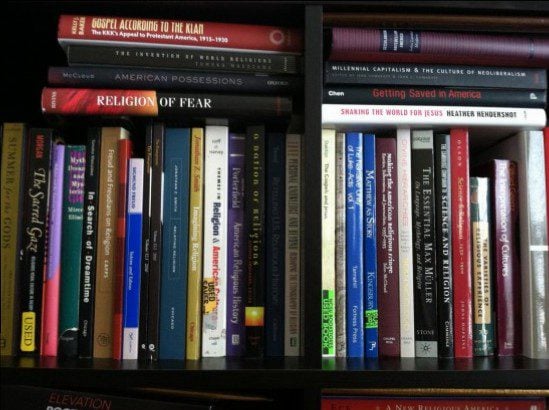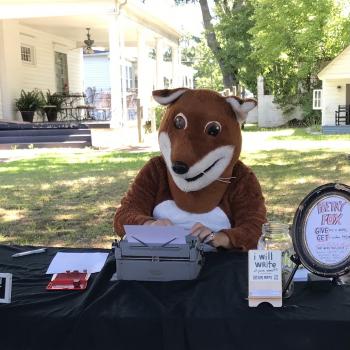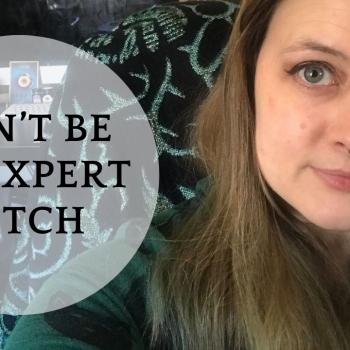
All I really wanted in life was to be Giles from Buffy the Vampire Slayer.
That’s how this whole thing started. My girlfriends were like, “Oh, Slayers!” or “VAMPIRES YES.” And I was all, “But Giles plays guitar and has lots of books!”
I’m super cool. I know.
I never did become Giles, but I landed the third best thing: getting involved in Pagan studies and lecturing in a religious studies department at a state university.
It’s my dream job (minus the money and the entourage of palm-waving pool boys, although I can usually score a couple of free drinks at the bigger conferences). And it all started because of a conversation I had with a friend while I was still in school for music, realizing that I was focusing on the wrong thing:
“What if you just professionally studied witchcraft? Is that a thing you can do? Do you guys have seminaries or something?”
For some reason, this had never occurred to me. A quick Google search turned up Cherry Hill Seminary (which I sort of vaguely knew about) and a couple of “nature religion” programs at universities many, many states away. I was enrapt. And Cherry Hill was just instituting an MA program, so the whole thing felt like kismet.
It didn’t play out that way, though. I decided to pursue things more traditionally and work through an accredited university (CHS is working toward accreditation now, and it’s an arduous, expensive process, which you can read about here). I also didn’t want to do something confessional, sticking to reserved, outsider scholarship, insofar as that’s ever really possible for a practitioner. And that meant going the religious studies route, which is (at least ideally) secular (again, insofar as that’s really a thing).
So I dropped out of music school and enrolled in a religious studies program, with graduate school being the end goal (well, becoming Giles was the end goal, but I didn’t quite phrase my application essays that way).
It’s been a long, taxing (not to mention expensive) process, and I thought it’d be worth shedding some light, since this is a question I receive with some frequency (whether from my own students, or just young, would-be Pagan scholars I encounter online or in my travels). Pagan studies is a rapidly growing field, with a lot of people working super hard to attract interest, garner funding, and all that good stuff (which in turn leads to support and resources for places like Cherry Hill and all of that organized community that Pagans are always collectively clamoring for). So it’s a worthy question, and I’m happy to throw in whatever insight I can:
Getting involved in the formal academic study of witchcraft (or Paganism more broadly, if that’s what you’re going for) actually isn’t that different from finding an amazing coven. You have to follow some weird leads, look in non-obvious places, and do a lot of waiting.
Begin by understanding that you’ll rarely encounter a class called “Paganism in the United States” or “Contemporary Witchcraft” or some such. You have to dig. Begin by signing up for classes in a religious studies, anthropology, or folklore department. Depending on what your specific research interest is, you’ll want to track down the professor(s) who specializes in that geographical region (usually, focus areas are divided by geography, chronology, or by specific tradition, but there probably won’t be someone who specializes in the exact tradition you’re pursuing). For me, that meant endearing myself to the Americanists. I took classes in American religious history and traditions and focused my assignments and additional readings on contemporary witchcraft and Paganism, always working to consider them in the context of the wider field.
When your professor assigns a book review or an essay on some trend in the religious whatnot, that’s when you pull out your personal interests. They’ll probably never be handed to you in an obvious, clear-cut way. Be creative. Whenever the conversation turned to religion and sexuality, I brought up Crowley, Gardner, or the Church of All Worlds. I took courses in Buddhism and Chinese religions and found ways to talk about Helena Blavatsky and Henry Steel Olcott (and, obviously, by extension, European occultism). I brought conversations about religious art and iconography back to the tarot. I took ethnography classes and did my fieldwork amongst Pagan groups. I took all of that introductory theory—Rudolph Otto, Jonathan Z. Smith, Victor Turner, Emile Durkheim, and the rest of the white dude canon—and I considered them in light of the groups and movements I wanted to study. All of that gave me the foundation to do better work in the future, meet and work with a bigger variety of people, and make myself more marketable (because the other thing to understand is that academia is a business, like any other, and you have to be able to sell your product).
At no point did I take a class or have a professor that specifically focused on witchcraft, Paganism, or the occult. You probably won’t either. This should not discourage you. The fact that there isn’t an academic department out there that’s prepared to hand you a degree in witchcraft on a platter isn’t an excuse to not pursue your interests [cue somebody commenting about Isaac Bonewits]. There’s an element of creativity in higher education. You’ve also got to do a bit of elbow-rubbing.
That elbow-rubbing mostly happens at conferences. Go to those. A lot of undergraduates don’t realize that this is an option. The truth is that you don’t need to have lots of letters after your name in order to attend (and maybe present) at conferences, or to publish, for that matter. Undergraduates are often surprised to find out that they can submit papers and participate in “grown-up” scholarship. You can do it, provided your work is up to par. If it’s not up to par yet, go as an observer. Ask questions, meet people, learn something (and don’t just go to the panels about Paganism). At my first big conference, I fangirled at Graham Harvey, who was sealed in an elevator with me for a brief but exciting thirty seconds. A couple of years ago, I got to meet Ronald Hutton, which sent me into a gleeful fit of squealing joy. It was like the nerd version of a David Cassidy concert. I’ve hung out with Chas Clifton and Christine Hoff Kraemer. Helen Berger once critiqued a paper I presented, and I couldn’t have been more pleased. She could have been calling me an idiot and I wouldn’t have cared, because it would still be awesome. Conferences are just great. If you are committed to an academic career, find a way to go to as many as possible (and there’s a chance your department has some meager funding laying around for this sort of thing but hasn’t made a point of letting the undergraduates or MA students know).
So here I am, about eight years later. I didn’t go the PhD route, partially because I was exhausted and partially because I was already doing everything I had set out for myself: research, teaching, being part of larger scholarly conversations, etc.
Being Giles part-time doesn’t pay all the bills, but it’s a lot of fun and keeps me sharp. I’m constantly being pushed to explore new things, to respond to challenges raised by my peers and mentors, and to look at my own Craft with the discerning consideration of an outsider (which is incredibly difficult and humbling). It was supposed to be a secular activity, but it turned into something that has a lot of impact on my religious practices.
Whatever your own ambitions in school, if you’re creative and determined, you probably have options. Be frank with your advisor, be honest about your interests, and don’t be so easily persuaded that your goals are impossible (though there’s a fair chance that they require more work than you initially imagined, and a level of competitiveness that just can’t be imitated). Read a ton. Dig out all of the academic work you can that’s related to your interests. Read everything by everyone I mentioned, plus more. Read more broadly about religion, magic, and whatever else might be related. Take advantage of that university library, which, aside from books, grants you access to online databases like JSTOR (and remember interlibrary loan is a thing). It’s part of your tuition. Use it.
Write a lot, too. Share it and take criticism seriously, but not personally. It’s your job to keep abreast of the conversations in your field. That means reading new articles, new books, blogs, and anything else available to you. You have to do your fucking homework (and that means performing well in all of those gen eds, your Hebrew Bible class, and any other course that feels like a waste of time to you).
And, like I’m always begging freshmen, go to office hours. You’d be amazed at the sort of people who are teaching your classes.















